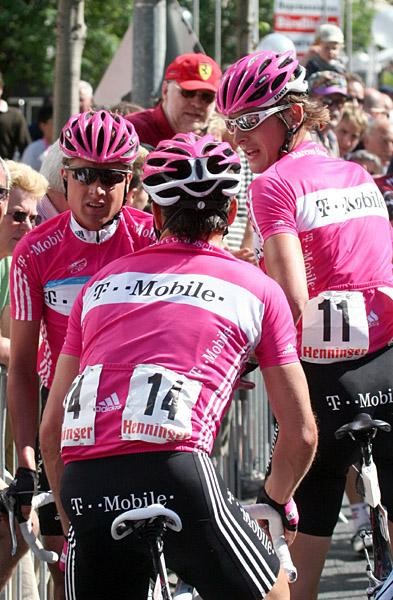Lawyer versus doping fighter
By Bjorn Haake As reported yesterday , the German weekly sports show, das aktuelle Sportstudio ,...

By Bjorn Haake
As reported yesterday, the German weekly sports show, das aktuelle Sportstudio, featured Wolfgang Lehner, the lawyer generally used by high profile sports stars, and Helmut Pabst, head of the anti-doping lab PWC that carries out most of the tests for NADA, the German anti-doping agency.
Pabst was shedding some light on the randomness of the controls. "We got informed on June 4 that we were supposed to carry out those tests." This included for his team to get ready and travel to Southern France for a surprise visit in the T-Mobile camp. Papbst did not accompany his experts, "who are very experienced." The tests were carried out June 8. Pabst said that the biggest problem was to get to the riders directly. "We had information that they would return at 5pm, and right on time someone in a T-Mobile kit arrived, but it turned out to be a soigneur," the anti-doping expert commented on the fact that the riders were likely warned while they were still out training. "On the bright side, every rider showed up for the test, so it looks the team management made sure everyone would be available."
Pabst sees some difficulty of doing truly random training controls in reality. "We are not identifying ourselves, but even at the junior track and world championships in Holland recently, where I didn't think anybody would know me, I was greeted in the hotel with 'Hello Dr. Pabst'."
Michael Lehner is more concerned with the rights of the athletes and that the tests are all carried out according to procedure, including the correct cooling of the samples. Lehner did not say there isn't a doping problem, but feels that right now there is a tendency to only after the riders, which are only a small part of the system. He'd prefer a general amnestie for those who come out, such as Jör Jaksche recently.
The German lawyer said that there needs to be a radical shift in the whole system. Right now it seems to him that the old guys, who grew up on doping, are now in charge of things. He specifically mentioned Bernard Hinault, and while he wasn't a 100 percent certain thought that "I think he had been tested positive before."
Helmut Pabst for his part contended that there just wasn't enough money to be as effective as possible. He did emphasize that they have a good system in place, "with a head controller to guide the team," in order to make sure that the sports person will be accompanied at all times from the finish of the race to the providing of the sample. We learned that from the skiing events, which have difficult logistics."
The latest race content, interviews, features, reviews and expert buying guides, direct to your inbox!
He did acknowledge that in Klöden's case the Tour de France organisers made a mistake. After Saturday's time trial, Andreas Klöden was able to get into a team's van after the race, instead of being accompanied by an anti-doping expert, as should be the case under the Chaperon ('companion') system implemented for cycling races in 2006.
This was similar to Sinkewitz. The anti-doping crew was awaiting the riders after their training ride at the hotel. Australian's Mick Rogers asked if he could take a shower before, which was denied, but Patrik Sinkewitz did manage to get into his room first. The anti-doping team came within minutes to accompany him to the testing area, which "is certainly not set up like at the Olympics, but was better than we find in many other out-of-training controls," Pabst emphasized and rejected criticism from the T-Mobile riders, who had called it the "most chaotic training control they ever endured."
All riders had left notes on the report about their dissatisfaction, with one rider, who was not Sinkewitz, adding comments "that filled the whole flip side of the report," according to Lehner.
Both agreed that because the Danish federation had suspended Rasmussen, there was nothing the Tour de France organisers could do, as an athlete cannot be punished twice.
Asked if he watched spots on TV as a fan or as an anti-doping expert, Pabst acknowledged that he doesn't have much time to watch TV, but occasionally tunes into basketball, "and then I get so much into it that I probably don't think about doping."